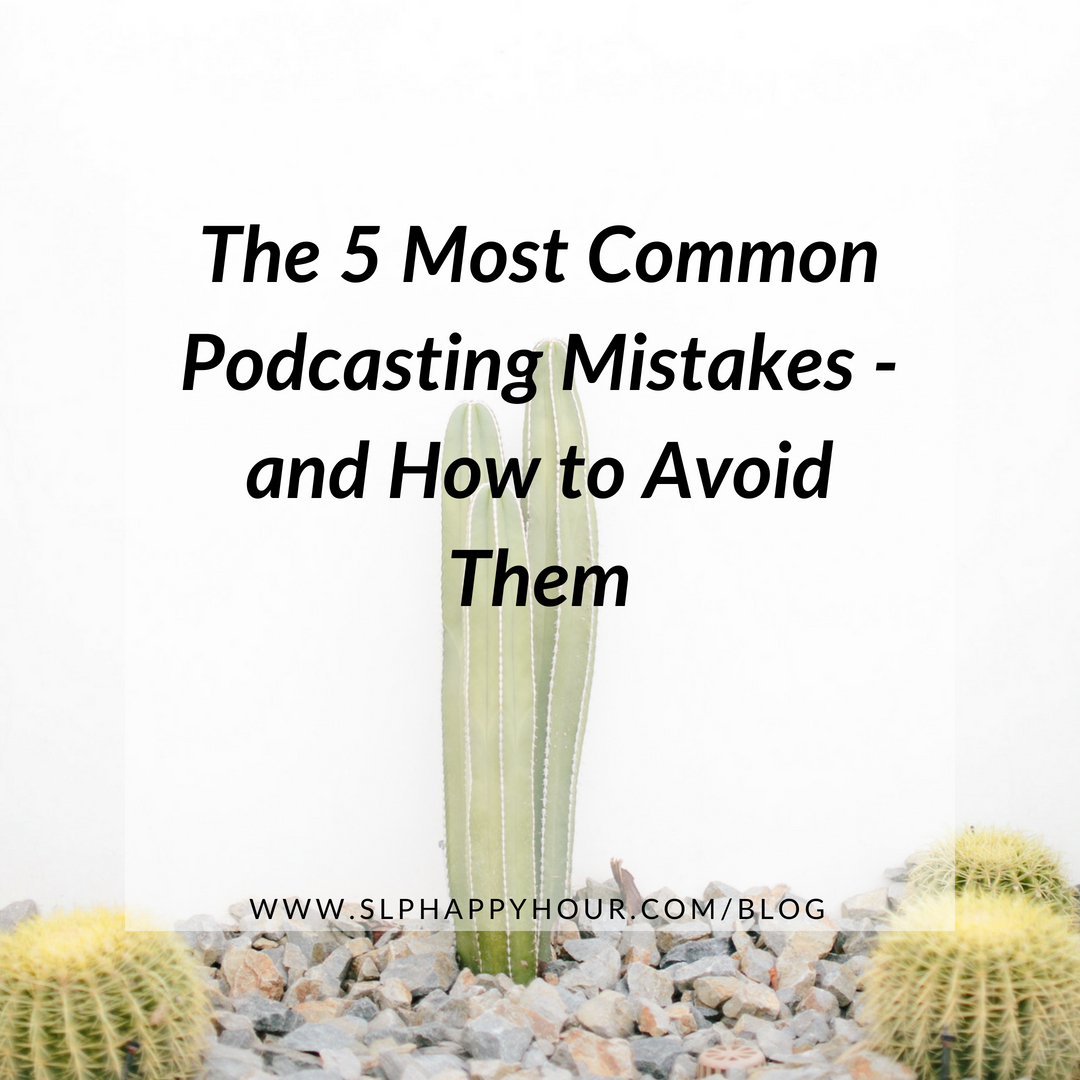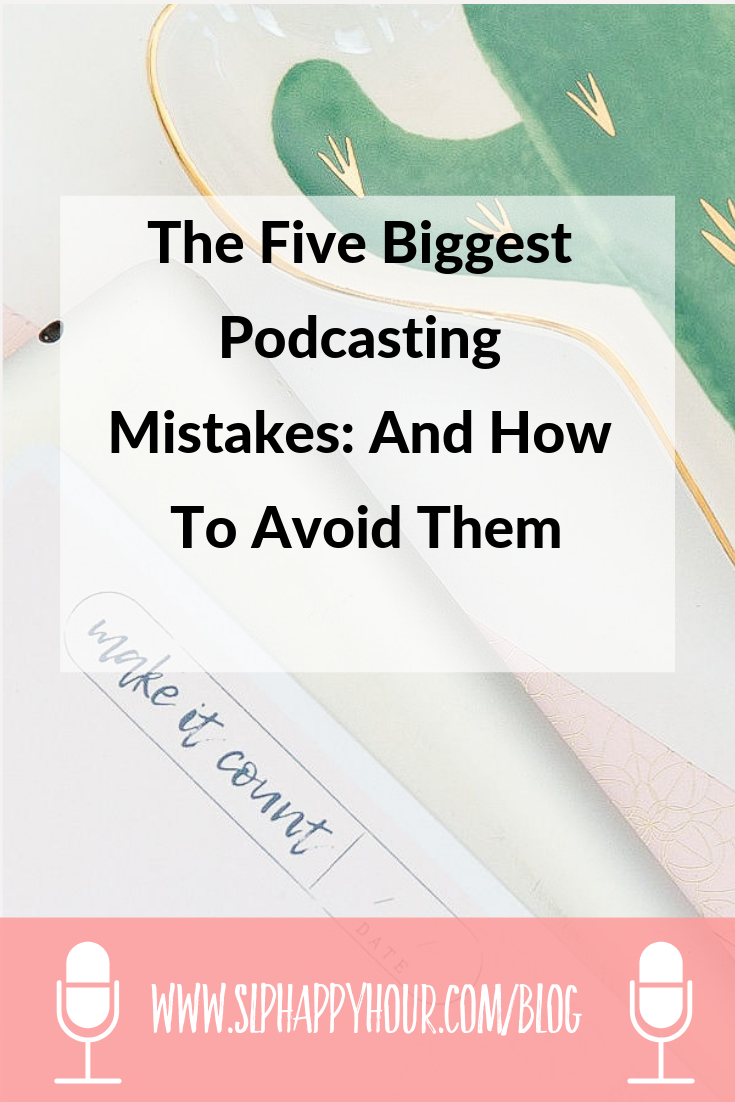There are a lot of great podcasts out there.
I love podcasts, and recently subscribed to more than 30 of them - until podcasts were taking up all of my phone memory and I had to cull my collection. It was mandatory, since my phone stopped actually working because its memory was so overloaded with podcast episodes. I still subscribe to more than 15, and my phone is in working order again, thankfully.
As I've listened to podcasts, and created my own podcast, I've learned a lot about what makes a podcast easy (and enjoyable) to listen to, and what has me hitting the unsubscribe button.
I'll outline the five most common podcast mistakes here, with suggestions of what you can do to avoid them. Some of these mistakes I've learned from personal experience, and some I've heard other podcasters make. Whether you have a podcast, are thinking about it, or are just interested in podcasting - this post is all about how to create an easy-to-listen-to podcast, and your listeners will thank you later for making their experience more enjoyable.
Don’t: Turn your head away from the microphone
Do: Familiarize yourself with your microphone settings, and make sure you face in the direction of the microphone any time you are speaking
I have a favorite podcast that has more than 200 episodes and more than a million downloads. I keep listening because the topics and discussions are so good.
But you know what? She makes a major podcast faux paus...every single episode. As she gets into what she's talking about, it seems like she forgets she has an audience entirely. She turns her head away from the microphone for entire sentences, making it impossible to hear her on a reasonable volume with earbuds, only to get louder once again. I feel sad to miss out on what she has to say so often, because I just can't hear her.
I'm stuck with this particular podcast (I love it so much), but when I try out new podcasts and I can't hear the host, I do hit the unsubscribe button.
How can you avoid this mistake? Remember that listeners are wearing earbuds, so huge fluctuations in sound really matter. Remember to speak in an even tone (with not too many loud-soft fluctuations), and listen to your episode after it records to make sure your listeners will be able to hear you.
Don’t: Don’t conduct a remote interview (for example via Skype or Google Hangouts) and listen to the interview with your computer speakers while you record (holy echo!)
Do: Wear earbuds or a headset for interviews that are conducted remotely
If you interview someone who isn’t in your studio with you (for example: via Pamela for Skype, Google Hangouts, or Zoom), and don’t wear a headset, you’ll get a terrible delayed echo on your interview that will make the entire interview unusable. I’ve noticed several podcasts that interview people with this delayed echo, which makes it impossible to understand what is being said. This gets me hitting the delete and unsubscribe button immediately.
How can you avoid this? Thankfully, there is an easy fix - hook some headphones up to your computer and record from there, so your microphone is recording your sound, and you hear your interviewee through your ear buds or headphones.
Don’t: Skip the editing step
Do: Edit each episode for smooth delivery and clarity
Please, tell me you edit your podcast.
Are there successful podcasts that are very lightly edited? Yes!
I believe editing is a mandatory step because I don’t want to waste the time of my listeners. I know my listeners are busy. I know they don’t have much time. I know they are listening while they drive, clean house, or wait for an appointment. Listeners are busy, so I value their time. Because of this, I want their listening experience to be as pleasurable and as easy as possible.
When I listen to unedited podcasts where people talk around something, flub up and then start again, I can’t help but feel a low level of frustration. These podcasters are making my listening experience difficult (putting me at a disadvantage) for their own gain (to avoid the hassle of editing). Show your audience you care for them by respecting their time, and take the burden and hassle of editing upon yourself. Remember - editing is something that you do to be kind to your audience. Is it tedious? Yep. Is it mandatory? Nope. Is it the right thing to do? I’d argue, absolutely.
Don’t: Ramble, get off topic
Do: Use a script or a detailed outline to fully prepare for each recording
Why do you need to use a script?
At least when you start out, using a script - like editing - saves your listeners time and makes listening easy for them.
If you think you can just “wing it” and are not a public speaker, teacher/professor/lecturer, or improv comedian, chances are you aren’t as good at “winging it” as you think you are.
When we first started recording, I wondered if I could just wing it. Turns out, I cannot. It sounds OK, but isn't great. However, when I have a detailed outline to work from, I'm able to dig deeper into our topics and provide more insight to our listeners.
So, here’s what to try instead:
Pre-Recording
You should already know what the format of your podcast will be (interview, co-hosted, solo hosted), so choose a few topics to discuss and outline those. If this is an interview show, it may be helpful to pre-interview your interviewee to have a conversation around those subjects and see how it goes. I haven’t done the pre-interview in the past, but plan to do so in the future to improve my own interviews and make sure they stay on topic.
If you are a solo-hosted or co-hosted show, I’d start with an outline that’s more detailed than you think you will need, and reduce that level of support as you go on and get more practiced.
You can do a run-through before you record - we did this for the first four months or so until this step just got easier and we found we didn’t need to anymore.
Recording
Before you record, make sure you are fully prepared and know what will be covered. If you work with others, make sure everyone is working from the same outline or script document.
If you flub up, wait for a second and start over, and you can edit that bit out later.
Post Recording
Edit for mistakes, but also content. Did you stay on topic? Is there a take-away message or something your listeners can learn from listening? What can you do better next time?
Don’t: Be a generalist
Do: Find a niche, setting or topic that you can talk about that provides value to your audience
What is your podcast about?
Are you covering a specific topic? Do you have a different perspective? How is your podcast different from the others out there?
When we first started our podcast, I really thought our topic was way too specific - I wanted to talk about work and wellness, self care, and how we relate to this profession in unhealthy ways sometimes (and what to do about it). I figured my audience would be tiny, because I was being so specific.
In reality, that couldn't be further from the truth. When you get specific, listeners who want to hear what you have to say will be able to find you.
You don’t need a tagline - but you should be able to sum up your podcast focus in one sentence.
For example, some examples off the top of my head:
My podcast gives practical AAC advice in the form of interviews from industry experts.
My podcast gives social skills goals and ideas in a solo hosted format through shows that specifically outline social skills intervention ideas.
Keeping your podcast to a specific topic is a kindness to your audience, because it allows them to know what to expect from your podcast and allows listeners looking for more information on your specific topic to know what you offer.
Have you made these mistakes?
Great. Me too. That means you are human. That means I am human. We all flub up.
As I reflect on these mistakes I’ve made in the past, I can’t help but think of the mistakes I’m probably making now and don’t even know I’m making. I’ve been podcasting since January 2018, so this is still pretty new for me. If I were to write an update on this post in six months, I’m sure there are things I’m doing right now, that would go on my future “don’t-do” list. For example, right now Sarie and I are problem solving around the audio quality of our interviews (which we aren't satisfied with), and are trying to make them better. I'm sure six months from now I'll tell you all kinds of things I'm doing wrong right now.
This is all a learning process - sometimes just by trial and error.
Want more podcast ideas?
If you are interested in more about podcasting, you may be interested in my previous blog post, 5 Essentials for Your SLP Podcast.
Interested in listening to our podcast? Click here.
More From Us
If you liked this article, please sign up for our monthly email newsletter. There, you’ll get behind-the-scenes information about the podcast and helpful tips and tricks for improving your SLP life. You’ll also get a monthly digest of our blog posts, delivered straight to your inbox so you won't miss the next post.


